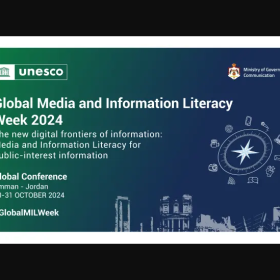Introduction
In the 21st century, the importance of digital literacy and skills has become increasingly evident. Digital literacy is the ability to access, manage, understand, integrate, communicate, evaluate and create information safely and appropriately through digital technologies for employment, decent jobs and entrepreneurship (UNESCO 2018). These skills are crucial for achieving the United Nations’ Sustainable Development Goals (SDGs). The SDGs are part of the Global 2030 Agenda for Sustainable Development, aimed at addressing a range of global issues, such as poverty, inequality, climate change, environmental degradation, peace, and justice (UN 2015). This article explores the critical role of digital literacy and skills in advancing the SDGs.
Importance of Digital Literacy and Skills
Digital literacy and skills are crucial for modern education and career development. Koppel and Langer (2020) emphasized the importance of basic IT skills and information management. Iordache et al. (2017) highlighted the complexity of digital literacy, encompassing technical skills, information literacy, media literacy, and critical thinking. Erwin and Mohammed (2022) demonstrated that specialized digital literacy instruction enhances student proficiency, essential for academic and career success. Neumann et al. (2017) underscored the role of early digital literacy in children’s reading and writing development. These studies collectively underscore the necessity of integrating digital literacy education at all levels to improve educational outcomes and economic growth.
Digital Literacy and SDG 4: Quality Education
SDG 4 aims to ensure inclusive and equitable quality education and promote lifelong learning opportunities for all (UN 2015). In the digital age, digital literacy is a key factor in achieving this goal. By enhancing digital skills, educators can utilize modern teaching tools and resources to improve teaching quality and learning outcomes. For instance, online courses and educational platforms provide access to high-quality educational resources to more people, regardless of their geographic location or economic status (UNESCO 2011).
Digital Literacy and SDG 8: Decent Work and Economic Growth
SDG 8 emphasizes promoting inclusive and sustainable economic growth, full and productive employment (UN 2015). Digital literacy plays a significant role in this goal. Digital skills enhance the productivity and competitiveness of the workforce, enabling them to adapt to rapidly changing technological environments and find jobs in new sectors. For example, digital skills enable more people to participate in the global digital economy, secure decent jobs, and drive economic growth (WEF 2020).
Digital Literacy and SDG 9: Industry, Innovation, and Infrastructure
SDG 9 focuses on building resilient and sustainable infrastructure, promoting inclusive and sustainable industrialization, and fostering innovation (UN 2015). Digital literacy and skills are central to achieving this goal. Innovation requires strong digital infrastructure and high levels of digital skills. For example, emerging technologies such as artificial intelligence, the Internet of Things, and big data analytics all depend on advanced digital skills. Digital transformation can significantly enhance the innovation capacity and competitiveness of businesses and society (WEF 2023).
Digital Literacy and SDG 17: Partnerships for the Goals
SDG 17 emphasizes strengthening the means of implementation and revitalizing the global partnership for sustainable development (UN 2015). Digital literacy plays a crucial role in promoting global cooperation and partnerships. Through digital platforms and tools, countries can better share information, technology, and best practices to collaboratively address global issues. For example, open data and digital cooperation platforms can accelerate knowledge sharing and promote global sustainable development (UN 2020).
Conclusion
Digital literacy and skills play an indispensable role in achieving the Sustainable Development Goals. By enhancing digital literacy, we can improve education quality, promote economic growth, drive innovation, and strengthen global cooperation. Therefore, governments, educational institutions, and the private sector should work together to raise the level of digital literacy across society to ensure the successful realization of the Sustainable Development Goals.
Reference
Erwin, K., & Mohammed, S. (2022). Digital literacy skills instruction and increased skills proficiency. International Journal of Technology in Education and Science, 6(2), 323-332. DOI:10.46328/ijtes.364.
Iordache, C., Mariën, I., & Baelden, D. (2017). Developing Digital Skills and Competences: A Quick-Scan Analysis of 13 Digital Literacy Models. Italian Journal of Sociology of Education, 9(1), 6-30. DOI:10.14658/PUPJ-IJSE-2017-1-2.
Koppel, I., & Langer, S. (2020). Basic Digital Literacy: Requirements and Elements. Revista Práxis Educacional, 16(42), 326-347. DOI:10.22481/praxisedu.v16i42.7354.
Neumann, M. M., Finger, G. & Neumann, D. L. (2017). A Conceptual Framework for Emergent Digital Literacy. Early Childhood Education Journal, 45, 471-479. DOI:10.1007/s10643-016-0792-z.
UNESCO Institute for Information Technologies in Education (IITE). (2011). Digital literacy in education. Retrieved July 16, 2024, from https://iite.unesco.org/publications/3214688/.
UNESCO Institute for Statistics (UIS). (2018). A Global Framework of Reference on Digital Literacy Skills for Indicator 4.4.2. Montreal: UNESCO Institute for Statistics. https://uis.unesco.org/sites/default/files/documents/ip51-global-framework-reference-digital-literacy-skills-2018-en.pdf.
United Nations (UN). (2015). The Sustainable Development Goals (SDGs). Retrieved July 16, 2024, from https://sdgs.un.org/goals#icons.
United Nations (UN). (2020). The Sustainable Development Goals Report 2020. Retrieved July 16, 2024, from https://unstats.un.org/sdgs/report/2020/.
World Economic Forum (WEF). (2023). The Future of Jobs Report 2023. Retrieved from https://www3.weforum.org/docs/WEF_Future_of_Jobs_2023.pdf.
World Economic Forum (WEF). (2020). The Global Competitiveness Report 2020. Retrieved from https://www3.weforum.org/docs/WEF_TheGlobalCompetitivenessReport2020.pdf.
Author
WANG, Chao, School of Information Management, Sun Yat sen University, Information Coordinator of Information Literacy (INFOLIT) Section, IFLA
Scoure: IFLA
 1900 2039 – Ext: 408
1900 2039 – Ext: 408 thuvienntt@ntt.edu.vn
thuvienntt@ntt.edu.vn






